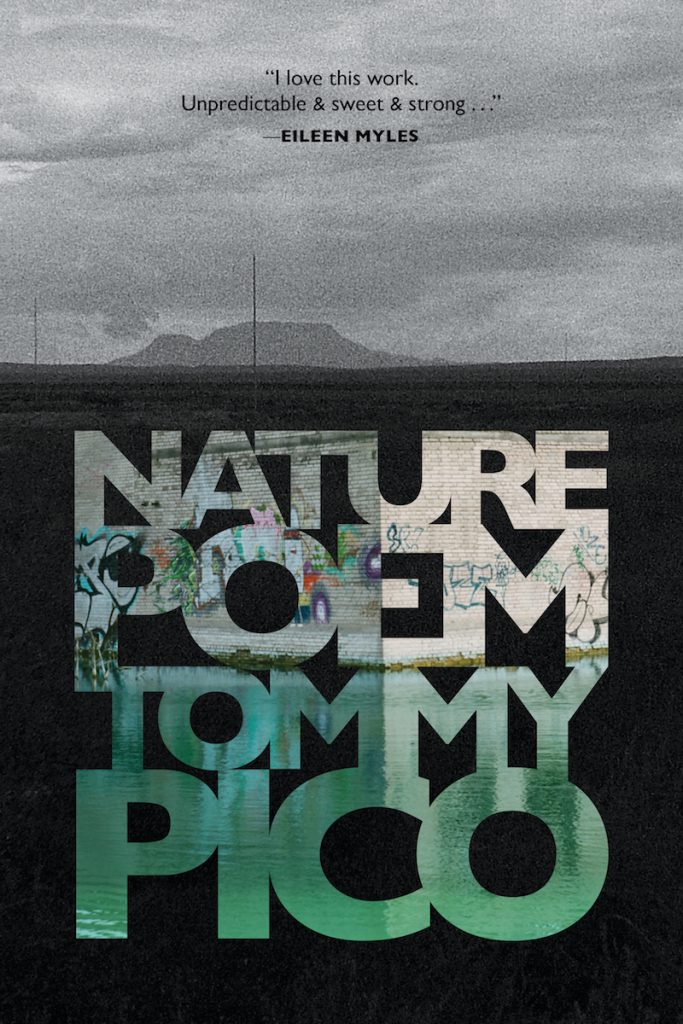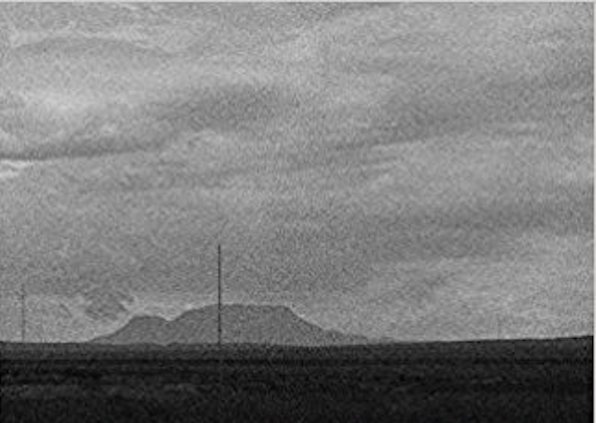Tommy Pico’s book-length epic Nature Poem is written, in parts, like a string of OK Cupid messages from every run-of-the-mill gay manic depressive I’ve ever met — frantic thoughts, ultimately wretched and whining.
Maybe that’s what grated on me at the onset of this young, gay, city-dwelling Native American man’s journey. All-too familiar to me, as a gay Arab-American man, are the histrionics that pass for conversation at the Boiler Room in the East Village or at The Abbey in WeHo on a Saturday night. Even at a gay bar I once visited in faraway Urumqi, China, there was this same mixture of thirst and depression. It’s a global plague, deeply bourgeois; if you have the disposable income to buy a drink at a gay bar, you probably have enough time to think. And if you think too much about what’s going on around you at a gay bar, you’ll probably become thirsty and depressed.
“Dear Gays, / I wish your attention span was as ‘athletic’ / as yr bod,” Pico writes, on an otherwise empty page. Basic bitch-ing.

But then he begins to build something fresh, part-criticism part-meditation, in juxtaposition with what came before: “it seems foolish to discuss nature w/o talking about endemic poverty / which seems foolish to discuss w/o talking about corporations given / human agency which seems foolish to discuss w/o talking about / colonialism which seems foolish to discuss w/o talking about misogyny”
Here, in the arrangement of the empty and fecund thoughts on these two pages, it becomes apparent that Pico has been laying the foundation for a commentary on the emptiness that is enforced with an oppressive ideological populism in the LGBT community, a penchant for mindless fucking disguised as a kind of liberation. An insidiousness. He had to build these cracked foundations in order to smash them and rebuild anew.
To be able to write his own “nature poem,” Pico must work past the bad faith notions of the Native and Queer body that have been projected onto him by a society of imperialists.
At just the right juncture in U.S. history, Pico has emerged as something of a ruthless Stonewall gay, or higher distinction, even — a member of the FLN, plotting a cultural overthrow in hushed tones. Perhaps Pico is the Joan Baez we’d anticipated — hoped — would come of these times?
Pico’s work is, in parts, a rose at the altar of the international decolonial movement, imagining what our LGBT and the broader community of marginalized Americans look like if we were to shake ourselves of our bourgeois comforts of the Obama Era and truly resist (purposefully un-hashtagged). It is, in parts, the continuation of a tradition of feverish incitements à la Frantz Fanon: in support of the last, that they should become the first.
There is a forceful internationalism in Pico’s work that seems especially potent now, after May Day demonstrations drew anti-Trump-administration crowds across the nation. Throughout the book is an acknowledgement, all-too-rare in our illin’ media, of the colonial experience — one which unites Indigenous nations across the U.S. to Mexican resort towns to the West Bank settlement — that elevates and contextualizes his rumination on the Queer experience in the period of Pence. Pico does not visit the Middle East in this epic, and yet the Middle East is discussed with intimacy, by a man born on a reservation to a society devastated by colonialism and its aftershocks. He has observed, in this work, the common threads between his ancestors and mine. And probably yours too. We are numerous. This book is for you. It’s not for them, it’s one of few things that’s for *you*.
Nature Poem elegantly weaves the threads of these societies with a graceful mixture of resentment and compassion. The epic has been described as “sweet” by Eileen Myles. More than “sweet,” Pico’s Nature Poem could be described as a destruction — a deconstruction. What is more necessary nowadays than the total destruction and rebirth of our society?
Pico’s is a story of hatred, self-hatred, and boundless resentment, one that reacts with vengeance to people whom he — as a young, Queer, Indigenous body — did not have the opportunity to smash with his words in this way:
oh, but you don’t look very Indian is a thing ppl feel comfortable saying to me on dates.
What rhymes with, fuck off and die?
It’s hard to look ‘like’ something most people remember as a ghost, but I understand the allure of wanting to know —
What he reclaims for himself in these violent rejections, he reclaims more generally for his people and an even broader group: the wretched of the earth. Later in the book, for instance, he skilfully conjures a vivid moment of his ancestors’ massacre by white settlers — a history that is passed over glancingly in public school texts.
Nature Poem successfully achieves a lot in the way of political treatise and self-portraiture — no small feat, in light of Pico’s infinite identities. If the book is intermittently mindless in an attempt to re-create the basic bitchness that is prized in parts of the gay community, those parts are matched by a deep love of our community. Edward Said, cultural critic and among the most cherished voices on Palestinian rights, was known to have been a strong critic of the Arab World, much as he defended it against Orientalism and many forms of imperialism. There’s an element of Said here.
Amid that indictment, there are moments of distilled sorrow where the situation of many gays in New York is described with great grace, as opposed to those moments of reflexive Grindr groaning.
“Last night I had a dream that I was a ghost who gave blowjobs and that is pretty much the experience of dating in the city,” he says.
At times that indictment of the gay experience is whimsical.
“I was just thinkin the Last Supper says way more abt Da Vinci than it does abt the good book, you know? There’s no likeness for the apostles — those were just men about his life or something. Who is the Jesus in the painting but the painter? Or is he the Judas?” he writes.
“Just kidding I never think.”


